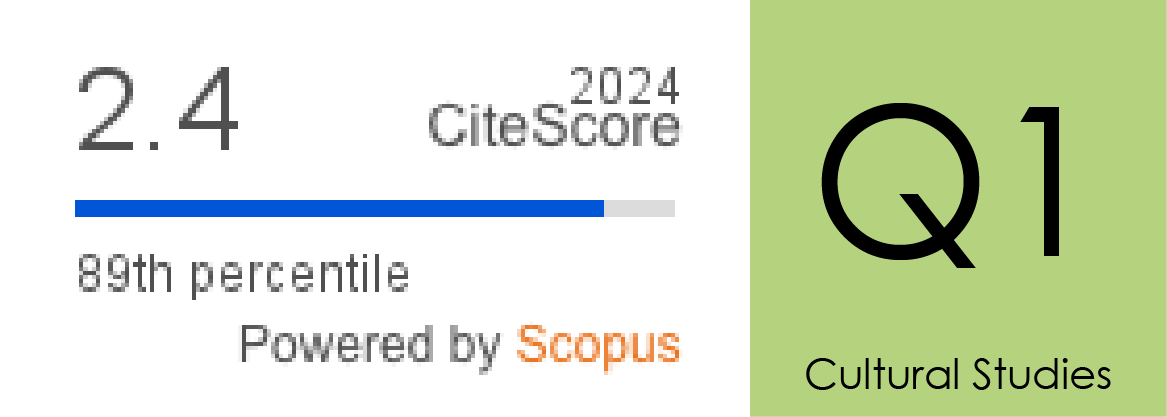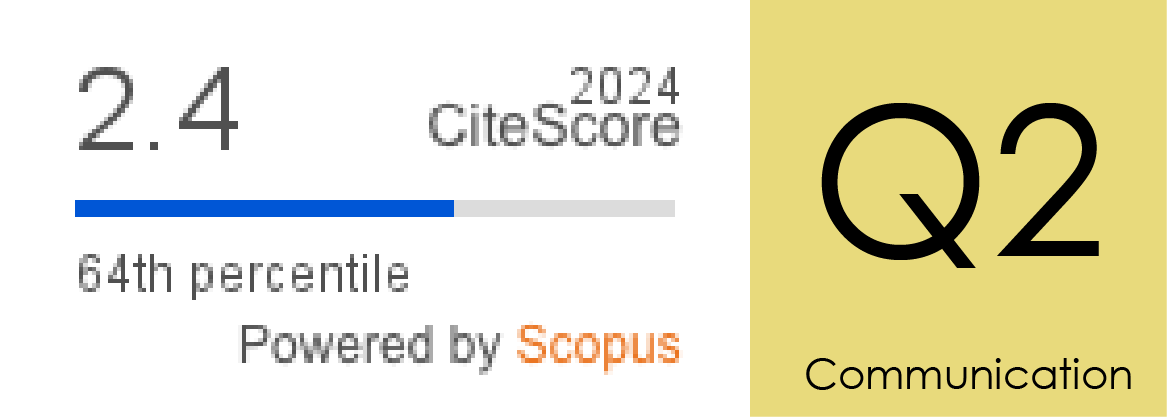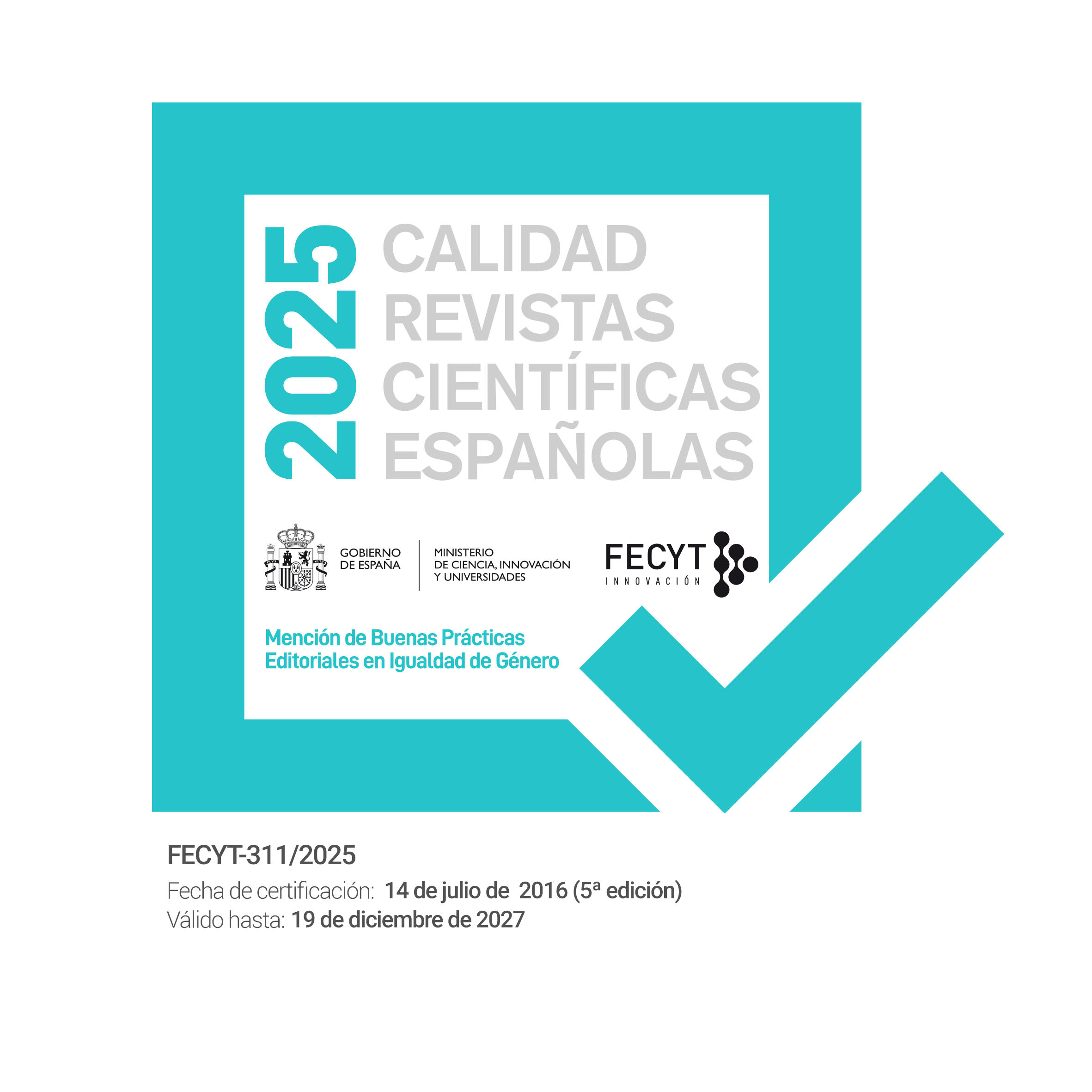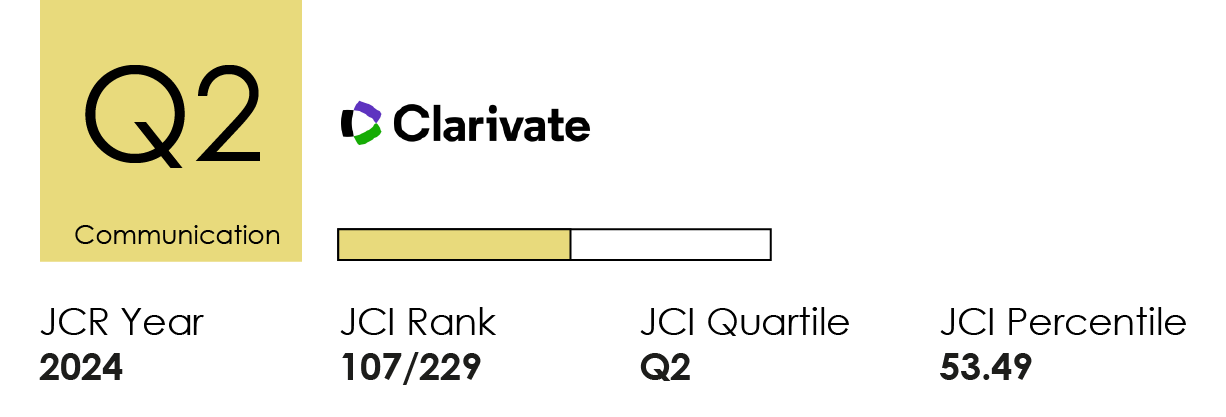Política, uso de medios y polarización afectiva en España
DOI:
https://doi.org/10.14198/MEDCOM.26681Palabras clave:
Medios de comunicación, polarización afectiva, consumo de información, redes sociales, televisión, periódicos digitales, exposición selectivaResumen
Esta investigación estudia la relación que existe entre la frecuencia con la que se consume información de carácter político a través de distintos medios (televisión, redes sociales y periódicos digitales) y la polarización afectiva individual, tanto respecto a los partidos en sentido abstracto como respecto a los líderes de esos partidos. Con el fin de analizar esta relación, se emplean datos de la II Encuesta Nacional de Polarización Política en España, realizada en el año 2022 por el CEMOP, y se lleva a cabo, primero, un análisis de diferencias de medias con la prueba ANOVA, para más tarde aplicar modelos de regresión lineal múltiple que permiten comprobar la influencia de la frecuencia de uso de medios en las actitudes afectivas de los españoles. Los resultados confirman que aquellos individuos que consumen de forma más recurrente noticias son también los que de media están más polarizados y, al mismo tiempo, se constata que el mayor consumo de información a través de redes sociales y de periódicos digitales incrementa la polarización afectiva individual respecto a los partidos y a sus líderes. Cuanto más intensamente se consume información política, más aumenta la probabilidad de entrar en contacto con contenidos polarizantes y los efectos cognitivos y actitudinales de los medios se harán más presentes.
Citas
Adams, J., Bracken, D., Gidron, N., Horne, W., O´Brien, D., & Senk, K. (2022). Can’t We All Just Get Along? How Women MPs Can Ameliorate Affective Polarization in Western Publics. Cambrige Core, 117(1), 318−324. https://doi.org/10.1017/S0003055422000491
Bail, C. A., Argyle, L. P., Brown, T. N., Bumpus, J. A., Chen, H., Hunzaker, M. B. F., Lee, J. M., Mann, M., Merhout, F., & Volfovsky, A. (2018). Exposure to opposing views on social media can increase political polarization. Proceedings of the National Academy of Sciences of the United States of America, 115(37), 9216−9221. https://doi.org/10.1073/pnas.1804840115
Banda, K., & Cluverius, J. (2018). Elite polarization, party extremity, and affective polarization. Electoral Studies, 56, 99−101. https://doi.org/10.1016/j.electstud.2018.09.009
Bankert, A. (2021). Negative and Positive Partisanship in the 2016 U.S. Presidential Elections. Political Behavoir, 43(4), 1467−1485. https://doi.org/10.1007/s11109-020-09599-1
Beam, M., Hutchens, M., & Hmiwlowski, J. (2019). Facebook news and (de)polarization: reinforcing spirals in the 2016 US election. Information, Communication & Society, 21(7), 940−958. https://doi.org/10.1080/1369118X.2018.1444783
Berry, J. M., & Sobieraj, S. (2016). The Outrage Industry: Political Opinion Media and The New Incivility. Oxford University Press.
Boxell, L., Gentzkow, M., & Shapiro, J. M. (2017). Greater Internet use is not associated with faster growth in political polarization among US demographic groups. Proceedings of the National Academy of Sciences of the United States of America, 114(40), 10612−10617. https://doi.org/10.1073/pnas.1706588114
Chadwick, A. (2017). The hybrid media system: Politics and power. Oxford University Press.
Comellas, J. M. (2022). When polarised feelings towards parties spread to voters: The role of ideological distance and social sorting in Spain. Electoral Studies, 79(1), 102525. https://doi.org/10.1016/j.electstud.2022.102525
Dahlgren, P. M. (2022). Forced versus selective exposure: Threatening messages lead to anger but not dislike of political opponents. Journal of Media Psychology: Theories, Methods, and Applications, 34(3), 150−164. https://doi.org/10.1027/1864-1105/a000302
Dias, N., & Lelkes, Y. (2022). The Nature of Affective Polarization: Disentangling Policy Disagreement from Partisan Identity. American Journal & Political Science, 66(3), 775−790. https://doi.org/10.1111/ajps.12628
Druckman, J., & Levendusky, M. (2019). What Do We Measure When We Measure Affective Polarization? Public Opinion Quartery, 83(1), 114−122. https://doi.org/10.1093/poq/nfz003
Druckman, J., Levendusky, M., & McLain, A. (2017). No Need to Watch: How the Effects of Partisan Media Can Spread via Interpersonal Discussions. American Journal of Political Studies, 62(1), 99−112. https://doi.org/10.1111/ajps.12325
Flaxman, S., Goel, S., & Rao, J. M. (2016). Filter Bubbles, Echo Chambers, and Online News Consumption. Public Opinion Quarterly, 80(S1), 298−320. https://doi.org/10.1093/poq/nfw006
Garret, K., Gvirsman, S., Johnson, B., Tsfati, Y., Neo, R., & Dal, A. (2014). Implications of pro- and Counterattitudinal Information Exposure for Affective Polarization. Human Communication Research, 40(3), 309−332. https://doi.org/10.1111/hcre.12028
Garrett, R., Long, J. A., & Jeong, M. S. (2019). From Partisan Media to Misperception: Affective Polarization as Mediator. Journal of Communication, 69(5), 490−512. https://doi.org/10.1093/joc/jqz028
Gidron, N., Adams, J., & Horne, W. (2020). American Affective Polarization in Comparative Perspective. Cambridge University Press.
Gvirsman, S. D. (2014). It’s Not That We Don’t Know, It’s That We Don’t Care: Explaining Why Selective Exposure Polarizes Attitudes. Mass Communication and Society, 17(1), 74−97. https://doi.org/10.1080/15205436.2013.816738
Han, K. S. (2022). Education level and affective polarization: The mediation effects of psychological engagement in politics and authoritarian attitudes. Social Science Quarterly, 103(7), 1633−1646. https://doi.org/10.1111/ssqu.13228
Harteveld, F. (2021). Fragmented foes: Affective polarization in the multiparty context of the Netherlands. Electoral Studies, 71, 101−133. https://doi.org/10.1016/j.electstud.2021.102332
Harteveld, F., Mendoza, P., & Rooduijn, M. (2022). Affective Polarization and the Populist Radical Right: Creating the Hating? Government and Opposition, 57(4), 703−727. https://doi.org/10.1017/gov.2021.31
Huber, G., & Malhotra, N. (2017). Political Homophily in Social Relationships: Evidence from Online Dating Behavior. Journal of Politics, 79(1), 269−283. https://doi.org/10.1086/687533
Iyengar, S., & Westwood, S. (2015). Fear and Loathing across Party Lines: New Evidence on Group Polarization. American Journal of Political Science, 59(3), 690−707. https://doi.org/10.1111/ajps.12152
Iyengar, S., Lelkes, Y., Levendusky, M. N., & Westwood, S. (2019). The Origins and Consequences of Affective Polarization in the United States. Annual Review of Political Science, 22, 129−146. https://doi.org/10.1146/annurev-polisci-051117-073034
Iyengar, S., Sood, G., & Lelkes, Y. (2012). Affect, Not Ideology: A Social Identity Perspective on Polarization. Public Opinion Quarterly, 76(3), 405−431. https://doi.org/10.1093/poq/nfs038
Klar, S., Krupnikov, Y., & Ryan, J. B. (2018). Affective Polarization or Partisan Disdain? Untangling a Dislike for the Opposing Party from a Dislike of Partisanship, Public Opinion Quarterly, 82(2), 379−390. https://doi.org/10.1093/poq/nfy014
Knobloch-Westerwick, S. (2014). Choice and preference in media use: Advances in selective exposure theory and research. Routledge.
Knudsen, E. (2021). Affective Polarization in Multiparty Systems? Comparing Affective Polarization Towards Voters and Parties in Norway and the United States. Scandinavian Political Studies, 44(1), 34−44. https://doi.org/10.1111/1467-9477.12186
Lazarsfeld, P. & Merton, R. (1969) Mass Communication, Popular Taste and Organised Social Action. En W. Schramm (Ed.) Mass Communications (2nd ed.) (pp. 492-512). University of Illinois Press.
Lee, C., Shin, J., & Hong, A. (2018). Does social media use really make people politically polarized? Direct and indirect effects of social media use on political polarization in South Korea. Telematics and Informatics, 35(1), 245−254. https://doi.org/10.1016/j.tele.2017.11.005
Lee, S., Rojas, H., & Yamamoto, M. (2022). Social Media, Messaging Apps, and Affective Polarization in the United States and Japan. Mass Communication and Society, 25(5), 673−697. https://doi.org/10.1080/15205436.2021.1953534
Lelkes, Y., Sood, G., & Iyengar, S. (2017). The Hostile Audience: The Effect of Access to Broadband Internet on Partisan Affect. American Journal of Political Science, 61(1), 5−20. https://doi.org/10.1111/ajps.12237
Levendusky, M. (2013). How Partisan Media Polarize America. The University of Chicago.
Levendusky, M., & Malhotra, N. (2016). (Mis)perceptions of Partisan Polarization in the American Public. Public Opinion Quarterly, 80(S1), 378−391. https://doi.org/10.1093/poq/nfv045
Lu, Y., & Lee, J. K. (2019). Partisan Information Sources and Affective Polarization: Panel Analysis of the Mediating Role of Anger and Fear. Journalism & Mass Communication Quarterly, 96(3), 767−783. https://doi.org/10.1177/1077699018811295
Mayordomo-Zapata, C. (2021). Diferencias de género y edad en la polarización afectiva española: ¿Quién está más polarizado? Más Poder Local, (45), 147−161. https://shre.ink/8uxl
Moreno, S. (2021). El surgimiento de los partidos populistas como explicación del incremento de la brecha política en España. Más Poder Local, (45), 111−127. https://shre.ink/8uxn
Nordbrandt, M. S. (2021). Affective polarization in the digital age: Testing the direction of the relationship between social media and users’ feelings for out-group parties. New Media & Society, 25(12), 3392−3411. https://doi.org/10.1177/14614448211044393
Ondercin, H. L., & Lizotte, M. K. (2021). You´´ ve lost that loving feeling: how gender shapes affective polarization. American Politics Research, 49(3), 282−292. https://doi.org/10.1177/1532673X20972103
Phillips, J. H. (2022). Affective Polarization: Over Time, Through the Generations, and During the Lifespan. Political Behavior, 44(3), 1483−1508. https://doi.org/10.1007/s11109-022-09784-4
Prior, M. (2013). Media and Political Polarization. Annual Review of Political Science, 16(1), 101−127. https://doi.org/10.1146/annurev-polisci-100711-135242
Quattrociocchi, W., Scala, A., & Sunstein, C. R. (2016). Echo Chambers on Facebook. Social Science Research Network, 7(3), 361–76. https://doi.org/10.2139/ssrn.2795110
Rogowski, J., & Sutherland, J. (2016). How ideology fuels affective polarization. Political Behavior, 38, 485−508. https://doi.org/10.1007/s11109-015-9323-7
Rojo-Martínez, J. M. y Crespo, I. (2023). Lo político como algo personal: una revisión teórica sobre la polarización afectiva. Revista de Ciencia Política (Santiago), 43(1), 25−48. https://doi.org/10.4067/s0718-090x2023005000102
Rojo-Martínez, J. M., Crespo, I. y Mora-Rodríguez, A. (2023). Dinámicas emocionales intergrupales: un análisis sobre los rasgos de los electores polarizados afectivamente en España. REIS: Revista Española de Investigaciones Sociológicas, 184, 105−124. https://doi.org/10.5477/cis/reis.184.105
Scheufele, D., & Iyengar, S. (2014). The state of framing research: A call for new directions. En, K. Kenski & K. H. Jamieson (Eds.), The Oxford handbook of political communication (pp. 619–632). Oxford Handbooks.
Slater, M. (2007). Reinforcing spirals: the mutual influence of media selectivity and media effects and their impact on individual behavior and social identity. Communication Theory, 17(3), 281−303. https://doi.org/10.1111/j.1468-2885.2007.00296.x
Stroud, N. J. (2010). Polarization and Partisan Selective Exposure. Journal of Communication, 60(3), 556−576. https://doi.org/10.1111/j.1460-2466.2010.01497.x
Stroud, N. J. (2014). Selective Exposure Theories. Oxford University Press eBooks.
Suk, J., Coppini, D., Muñiz, C., & Rojas, H. (2022). The more you know, the less you like: A comparative study of how news and political conversation shape political knowledge and affective polarization. Communication and the public, 7(1), 40−56. https://doi.org/10.1177/20570473211063237
Sunstein, C. R. (2001). Republic. com. Princeton University Press.
Tajfel, H., & Turner, J. (1979). An integrative theory of intergroup conflict. En, W. Austin & S. Worchel (Eds.), The Social Psychology of Intergroup Relations. Monterey (pp. 33-47). Brooks Cole.
Teruel-Rodríguez, L. (2016). El impacto de la crisis política y económica sobre la polarización de los medios españoles. Historia y Comunicación Social, 21(1), 203−220. https://doi.org/10.5209/rev_HICS.2016.v21.n1.52692
Torcal, M. (2023). De votantes a hooligans. La polarización política en España. Catarata.
Törnberg, P. (2022). How digital media drive affective polarization through partisan sorting. Proceedings of the National Academy of Sciences of the United States of America, 119(42), e2207159119. https://doi.org/10.1073/pnas.2207159119
Törnberg, P., Andersson, C., Lindgren, K., & Banisch, S. (2021). Modeling the emergence of affective polarization in the social media society. PLoS ONE, 16(10). https://doi.org/10.1371/journal.pone.0258259
Tsfati, Y., & Nir, L. (2017). Frames and Reasoning: Two Pathways From Selective Exposure to Affective Polarization. International Journal of Communication, 11, 301−322. https://shre.ink/8utu
Valera-Ordaz, L., Calvo, D., & López-García, G. (2018). Conversaciones políticas en Facebook. Explorando el papel de la homofilia en la argumentación y la interacción comunicativa. Revista Latina de Comunicación Social, (73), 55-73. https://doi.org/10.4185/RLCS-2018-1245
Wagner, M. (2021). Affective polarization in multiparty systems. Electoral Studies, 69. https://doi.org/10.1016/j.electstud.2020.102199
Waisbord, S. (2020). ¿Es válido atribuir la polarización política a la comunicación digital? Sobre burbujas, plataformas y polarización afectiva. Revista SAAP, 14(2), 248−279. https://dx.doi.org/10.46468/rsaap.14.2.a1
Waldherr, A. (2018). Modelling issue-attention dynamics in a hybrid media system. En Peter Vasterman (Ed.), From Media Hype to Twitter Storm. News Explosions and Their Impact on Issues, Crises and Public Opinion (pp. 291−313). Amsterdam University Press.
Weaver, D. H. (1980). Audience Need for Orientation and Media Effects. Communication Research, 7(3), 361−373. https://doi.org/10.1177/009365028000700305
Wilson, A., Parker, V. A., & Feinberg, M. (2020). Polarization in the contemporary political and media landscape. Current opinion in behavioral sciences, 34, 223−228. https://doi.org/10.1016/j.cobeha.2020.07.005
Yarchi, M., Baden, C., & Kligler-Vilenchik, N. (2021). Political Polarization on the Digital Sphere: A Cross-platform, Over-time Analysis of Interactional, Positional, and Affective Polarization on Social media. Political Communication, 38(1-2), 98−139. https://doi.org/10.1080/10584609.2020.1785067
Descargas
Estadísticas
Publicado
Cómo citar
Número
Sección
Licencia
Derechos de autor 2024 Ismael Crespo-Martínez, Inmaculada Melero-López, Alberto Mora-Rodríguez, José-Miguel Rojo-Martínez

Esta obra está bajo una licencia internacional Creative Commons Atribución 4.0.
Los autores y autoras que publican en esta revista están de acuerdo con los siguientes términos:
1 Derechos de autor. Los autores y autoras conservan sus derechos de autor, aunque ceden a la revista de forma no exclusiva los derechos de explotación (reproducción, distribución, comunicación pública y transformación) y garantizan a esta el derecho de primera publicación de su trabajo, el cual estará simultáneamente sujeto a la licencia indicada en punto 2. Los autores pueden establecer otros acuerdos adicionales para la distribución no exclusiva de la versión de la obra publicada en la revista, siempre que exista un reconocimiento de su publicación inicial en esta revista.
© Los autores.
2 Licencia. Los trabajos se publican en la revista sujetos a la licencia de Reconocimiento 4.0 Internacional de Creative Commons (CC BY 4.0); los términos se pueden consultar en https://creativecommons.org/licenses/by/4.0/
Esta licencia permite a terceros compartir (copiar y redistribuir el material en cualquier medio o formato) y adaptar (remezclar, transformar y crear a partir del material para cualquier finalidad, incluso comercial), siempre que se reconozca la autoría y la primera publicación en esta revista (Revista Mediterránea de Comunicación (RMC) / Mediterranean Journal of Communication (MJC), Universidad de Alicante, DOI de la obra), se proporcione un enlace a la licencia y se indique si se han realizado cambios en la obra.
3 Política de autoarchivo. Se recomienda a los autores que difundan sus trabajos a través de Internet para favorecer una circulación y difusión más rápidas y, con ello, un posible aumento en la citación y alcance entre la comunidad científica y académica, en las siguientes condiciones:
No se permite a los autores depositar en un repositorio institucional o temático, página web propia, etc., las versiones preprint (versión antes de ser evaluada) o postprint (versión evaluada y aceptada para su publicación) de sus trabajos antes de su publicación, pero sí el artículo final publicado (versión del editor).














